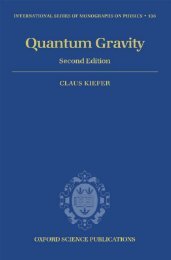- Page 2: This page intentionally left blank
- Page 8: APPROACHES TO QUANTUM GRAVITY Towar
- Page 12: A Sandra
- Page 18: viii Contents 11 String theory, hol
- Page 22: Contributors J. Ambjørn The Niels
- Page 26: xii List of contributors D. Oriti M
- Page 34: xvi Preface new mathematics as well
- Page 38: xviii Preface as the current tentat
- Page 44: Part I Fundamental ideas and genera
- Page 50: 4 C. Rovelli QFT relies heavily on
- Page 54: 6 C. Rovelli For instance, the Heis
- Page 58: 8 C. Rovelli Conceptually, the key
- Page 62: 10 C. Rovelli In addition, a number
- Page 66: 12 C. Rovelli [20] S. W. Hawking,
- Page 70: 14 G. ’t Hooft of time, of Cauchy
- Page 74: 16 G. ’t Hooft generally, in 2 +
- Page 78: 18 G. ’t Hooft of the small-dista
- Page 82:
20 G. ’t Hooft that a theory exis
- Page 86:
22 G. ’t Hooft This means that th
- Page 90:
24 G. ’t Hooft 2.7 Gauge- and dif
- Page 94:
3 Does locality fail at intermediat
- Page 98:
28 R. D. Sorkin a little thought in
- Page 102:
30 R. D. Sorkin this approach one n
- Page 106:
32 R. D. Sorkin The suggestion of o
- Page 110:
34 R. D. Sorkin But is our “discr
- Page 114:
36 R. D. Sorkin (as one might have
- Page 118:
38 R. D. Sorkin It seems likely tha
- Page 122:
40 R. D. Sorkin in particular, woul
- Page 126:
42 R. D. Sorkin small, as discussed
- Page 130:
4 Prolegomena to any future Quantum
- Page 134:
46 J. Stachel breakups, it is impor
- Page 138:
48 J. Stachel gauge fields and GR,
- Page 142:
50 J. Stachel where S is any 2-surf
- Page 146:
52 J. Stachel connection (see, e.g.
- Page 150:
54 J. Stachel of a projective struc
- Page 154:
56 J. Stachel problem on a spacelik
- Page 158:
58 J. Stachel (3) a break-up of the
- Page 162:
60 J. Stachel simplification of the
- Page 166:
62 J. Stachel investigate (3 + 1) a
- Page 170:
64 J. Stachel partitioned into slic
- Page 174:
66 J. Stachel [13] S. Frittelli, C.
- Page 178:
5 Spacetime symmetries in histories
- Page 182:
70 N. Savvidou of time. The develop
- Page 186:
72 N. Savvidou In order to define c
- Page 190:
74 N. Savvidou The novel feature in
- Page 194:
76 N. Savvidou We start instead fro
- Page 198:
78 N. Savvidou Relation between the
- Page 202:
80 N. Savvidou 5.4 A spacetime appr
- Page 206:
82 N. Savvidou the T 0 variables -
- Page 210:
Categorical geometry and the mathem
- Page 214:
86 L. Crane called morphisms [1]. A
- Page 218:
88 L. Crane are defined combinatori
- Page 222:
90 L. Crane 6.3.1 The BC categorica
- Page 226:
92 L. Crane Classical behavior occu
- Page 230:
94 L. Crane One could then apply th
- Page 234:
96 L. Crane This model also has a n
- Page 238:
98 L. Crane [13] J. Barrett and L.
- Page 242:
100 O. Dreyer Is spacetime fundamen
- Page 246:
102 O. Dreyer Since the inverse pro
- Page 250:
104 O. Dreyer where we have denoted
- Page 254:
106 O. Dreyer and the points are th
- Page 258:
108 O. Dreyer m 1 m 2 =− v 2 v 1
- Page 262:
110 O. Dreyer In addition to the pr
- Page 266:
112 R. Percacci In section 8.2 I in
- Page 270:
114 R. Percacci this case the theor
- Page 274:
116 R. Percacci The requirement of
- Page 278:
118 R. Percacci be bounded. This is
- Page 282:
120 R. Percacci where the heat kern
- Page 286:
122 R. Percacci ~ G 1 0.8 0.6 0.4 0
- Page 290:
124 R. Percacci will still be possi
- Page 294:
126 R. Percacci Einstein-Hilbert ac
- Page 298:
128 R. Percacci [24] O. Lauscher an
- Page 302:
130 F. Markopoulou has been claimed
- Page 306:
132 F. Markopoulou vertex x ∈ V (
- Page 310:
134 F. Markopoulou Note that comple
- Page 314:
136 F. Markopoulou 9.2.2 The meanin
- Page 318:
138 F. Markopoulou Fock space for t
- Page 322:
140 F. Markopoulou A = 1 A 2 A 3 A
- Page 326:
142 F. Markopoulou effective theori
- Page 330:
144 F. Markopoulou Quantum Field Th
- Page 334:
146 F. Markopoulou is concerned wit
- Page 338:
148 F. Markopoulou The dynamics is
- Page 342:
Questions and answers • Q - L. Cr
- Page 346:
152 Questions and answers Hausdorff
- Page 350:
154 Questions and answers - A-R.Sor
- Page 354:
156 Questions and answers Now a goo
- Page 358:
158 Questions and answers would see
- Page 362:
160 Questions and answers 3. You me
- Page 366:
162 Questions and answers - A - R.
- Page 370:
164 Questions and answers notion of
- Page 376:
Part II String/M-theory
- Page 382:
170 G. Horowitz and J. Polchinski a
- Page 386:
172 G. Horowitz and J. Polchinski w
- Page 390:
174 G. Horowitz and J. Polchinski w
- Page 394:
176 G. Horowitz and J. Polchinski w
- Page 398:
178 G. Horowitz and J. Polchinski T
- Page 402:
180 G. Horowitz and J. Polchinski m
- Page 406:
182 G. Horowitz and J. Polchinski N
- Page 410:
184 G. Horowitz and J. Polchinski c
- Page 414:
186 G. Horowitz and J. Polchinski [
- Page 418:
188 T. Banks This looks peculiar to
- Page 422:
190 T. Banks This lightning review
- Page 426:
192 T. Banks Since the holographic
- Page 430:
194 T. Banks definition of local ev
- Page 434:
196 T. Banks we have postulated are
- Page 438:
198 T. Banks with observerphilic de
- Page 442:
200 T. Banks de Sitter horizon is t
- Page 446:
202 T. Banks of the dS-Schwarzschil
- Page 450:
204 T. Banks Thus, there are of ord
- Page 454:
206 T. Banks it has given us a cons
- Page 458:
208 T. Banks [3] G. T. Horowitz, Th
- Page 462:
12 String field theory W. TAYLOR 12
- Page 466:
212 W. Taylor possible configuratio
- Page 470:
214 W. Taylor raising operators α
- Page 474:
216 W. Taylor ❍❨ 1 ❍❍✟
- Page 478:
218 W. Taylor level truncation is t
- Page 482:
220 W. Taylor different description
- Page 486:
222 W. Taylor In closed string fiel
- Page 490:
224 W. Taylor closed string field t
- Page 494:
226 W. Taylor or other 6D manifold.
- Page 498:
228 W. Taylor [37] W. Taylor, & B.
- Page 502:
230 Questions and answers 3. You st
- Page 506:
232 Questions and answers (proving
- Page 512:
13 Loop quantum gravity T. THIEMANN
- Page 516:
Loop quantum gravity 237 13.2 Canon
- Page 520:
Loop quantum gravity 239 In what fo
- Page 524:
Loop quantum gravity 241 equivalenc
- Page 528:
Loop quantum gravity 243 ∂ F τ f
- Page 532:
Loop quantum gravity 245 will play
- Page 536:
Loop quantum gravity 247 U(ϕ)T n =
- Page 540:
Loop quantum gravity 249 a definite
- Page 544:
Loop quantum gravity 251 [28] T. Th
- Page 548:
14 Covariant loop quantum gravity?
- Page 552:
Covariant loop quantum gravity? 255
- Page 556:
Covariant loop quantum gravity? 257
- Page 560:
Covariant loop quantum gravity? 259
- Page 564:
Covariant loop quantum gravity? 261
- Page 568:
Covariant loop quantum gravity? 263
- Page 572:
Covariant loop quantum gravity? 265
- Page 576:
Covariant loop quantum gravity? 267
- Page 580:
Covariant loop quantum gravity? 269
- Page 584:
Covariant loop quantum gravity? 271
- Page 588:
The spin foam representation of loo
- Page 592:
The spin foam representation of loo
- Page 596:
The spin foam representation of loo
- Page 600:
The spin foam representation of loo
- Page 604:
The spin foam representation of loo
- Page 608:
The spin foam representation of loo
- Page 612:
The spin foam representation of loo
- Page 616:
The spin foam representation of loo
- Page 620:
The spin foam representation of loo
- Page 624:
Three-dimensional spin foam Quantum
- Page 628:
Three-dimensional spin foam Quantum
- Page 632:
Three-dimensional spin foam Quantum
- Page 636:
Three-dimensional spin foam Quantum
- Page 640:
Three-dimensional spin foam Quantum
- Page 644:
Three-dimensional spin foam Quantum
- Page 648:
Three-dimensional spin foam Quantum
- Page 652:
Three-dimensional spin foam Quantum
- Page 656:
Three-dimensional spin foam Quantum
- Page 660:
Three-dimensional spin foam Quantum
- Page 664:
The group field theory approach to
- Page 668:
The group field theory approach to
- Page 672:
The group field theory approach to
- Page 676:
The group field theory approach to
- Page 680:
The group field theory approach to
- Page 684:
The group field theory approach to
- Page 688:
The group field theory approach to
- Page 692:
The group field theory approach to
- Page 696:
The group field theory approach to
- Page 700:
The group field theory approach to
- Page 704:
The group field theory approach to
- Page 708:
Questions and answers 333 the holes
- Page 712:
Questions and answers 335 their vac
- Page 716:
Questions and answers 337 of some s
- Page 724:
18 Quantum Gravity: the art of buil
- Page 728:
Quantum Gravity: the art of buildin
- Page 732:
Quantum Gravity: the art of buildin
- Page 736:
Quantum Gravity: the art of buildin
- Page 740:
Quantum Gravity: the art of buildin
- Page 744:
Quantum Gravity: the art of buildin
- Page 748:
Quantum Gravity: the art of buildin
- Page 752:
Quantum Gravity: the art of buildin
- Page 756:
Quantum Gravity: the art of buildin
- Page 760:
Quantum Gravity: the art of buildin
- Page 764:
Quantum Regge calculus 361 is given
- Page 768:
Quantum Regge calculus 363 group. W
- Page 772:
Quantum Regge calculus 365 emanatin
- Page 776:
Quantum Regge calculus 367 We will
- Page 780:
Quantum Regge calculus 369 reason,
- Page 784:
Quantum Regge calculus 371 gravitat
- Page 788:
Quantum Regge calculus 373 where ξ
- Page 792:
Quantum Regge calculus 375 [4] J. W
- Page 796:
Quantum Regge calculus 377 [52] M.
- Page 800:
Consistent discretizations as a roa
- Page 804:
Consistent discretizations as a roa
- Page 808:
Consistent discretizations as a roa
- Page 812:
Consistent discretizations as a roa
- Page 816:
Consistent discretizations as a roa
- Page 820:
Consistent discretizations as a roa
- Page 824:
Consistent discretizations as a roa
- Page 828:
21 The causal set approach to Quant
- Page 832:
The causal set approach to Quantum
- Page 836:
The causal set approach to Quantum
- Page 840:
The causal set approach to Quantum
- Page 844:
The causal set approach to Quantum
- Page 848:
The causal set approach to Quantum
- Page 852:
The causal set approach to Quantum
- Page 856:
The causal set approach to Quantum
- Page 860:
The causal set approach to Quantum
- Page 864:
The causal set approach to Quantum
- Page 868:
The causal set approach to Quantum
- Page 872:
The causal set approach to Quantum
- Page 876:
The causal set approach to Quantum
- Page 880:
The causal set approach to Quantum
- Page 884:
The causal set approach to Quantum
- Page 888:
The causal set approach to Quantum
- Page 896:
22 Quantum Gravity phenomenology G.
- Page 900:
Quantum Gravity phenomenology 429 T
- Page 904:
Quantum Gravity phenomenology 431 t
- Page 908:
Quantum Gravity phenomenology 433 c
- Page 912:
Quantum Gravity phenomenology 435 p
- Page 916:
Quantum Gravity phenomenology 437 F
- Page 920:
Quantum Gravity phenomenology 439 l
- Page 924:
Quantum Gravity phenomenology 441 p
- Page 928:
Quantum Gravity phenomenology 443 w
- Page 932:
Quantum Gravity phenomenology 445 i
- Page 936:
Quantum Gravity phenomenology 447 s
- Page 940:
Quantum Gravity phenomenology 449 [
- Page 944:
Quantum Gravity and precision tests
- Page 948:
Quantum Gravity and precision tests
- Page 952:
Quantum Gravity and precision tests
- Page 956:
Quantum Gravity and precision tests
- Page 960:
Quantum Gravity and precision tests
- Page 964:
Quantum Gravity and precision tests
- Page 968:
Quantum Gravity and precision tests
- Page 972:
Quantum Gravity and precision tests
- Page 976:
Algebraic approach to Quantum Gravi
- Page 980:
Algebraic approach to Quantum Gravi
- Page 984:
Algebraic approach to Quantum Gravi
- Page 988:
Algebraic approach to Quantum Gravi
- Page 992:
Algebraic approach to Quantum Gravi
- Page 996:
Algebraic approach to Quantum Gravi
- Page 1000:
Algebraic approach to Quantum Gravi
- Page 1004:
Algebraic approach to Quantum Gravi
- Page 1008:
Algebraic approach to Quantum Gravi
- Page 1012:
Algebraic approach to Quantum Gravi
- Page 1016:
Algebraic approach to Quantum Gravi
- Page 1020:
Algebraic approach to Quantum Gravi
- Page 1024:
Algebraic approach to Quantum Gravi
- Page 1028:
25 Doubly special relativity J. KOW
- Page 1032:
Doubly special relativity 495 DSR t
- Page 1036:
Doubly special relativity 497 On th
- Page 1040:
Doubly special relativity 499 some
- Page 1044:
Doubly special relativity 501 [x 0
- Page 1048:
Doubly special relativity 503 that
- Page 1052:
Doubly special relativity 505 can b
- Page 1056:
Doubly special relativity 507 scale
- Page 1060:
26 From quantum reference frames to
- Page 1064:
From quantum reference frames to de
- Page 1068:
From quantum reference frames to de
- Page 1072:
From quantum reference frames to de
- Page 1076:
From quantum reference frames to de
- Page 1080:
From quantum reference frames to de
- Page 1084:
From quantum reference frames to de
- Page 1088:
From quantum reference frames to de
- Page 1092:
From quantum reference frames to de
- Page 1096:
From quantum reference frames to de
- Page 1100:
Lorentz invariance violation & its
- Page 1104:
Lorentz invariance violation & its
- Page 1108:
Lorentz invariance violation & its
- Page 1112:
Lorentz invariance violation & its
- Page 1116:
Lorentz invariance violation & its
- Page 1120:
Lorentz invariance violation & its
- Page 1124:
Lorentz invariance violation & its
- Page 1128:
Lorentz invariance violation & its
- Page 1132:
Lorentz invariance violation & its
- Page 1136:
Lorentz invariance violation & its
- Page 1140:
Generic predictions of quantum theo
- Page 1144:
Generic predictions of quantum theo
- Page 1148:
Generic predictions of quantum theo
- Page 1152:
Generic predictions of quantum theo
- Page 1156:
Generic predictions of quantum theo
- Page 1160:
Generic predictions of quantum theo
- Page 1164:
Generic predictions of quantum theo
- Page 1168:
Generic predictions of quantum theo
- Page 1172:
Generic predictions of quantum theo
- Page 1176:
Generic predictions of quantum theo
- Page 1180:
Generic predictions of quantum theo
- Page 1184:
Questions and answers • Q - L. Cr
- Page 1188:
Questions and answers 573 frame. Ju
- Page 1192:
Questions and answers 575 - A - J.
- Page 1196:
Questions and answers 577 where thi
- Page 1200:
Questions and answers 579 would all
- Page 1204:
Index 581 cosmology, 26, 155, 184,
- Page 1208:
Index 583 emergent, 99, 109, 163, 1


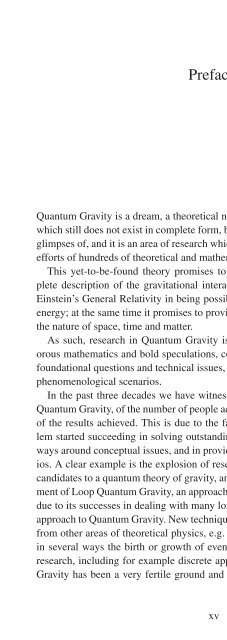
![arXiv:1001.0993v1 [hep-ph] 6 Jan 2010](https://img.yumpu.com/51282177/1/190x245/arxiv10010993v1-hep-ph-6-jan-2010.jpg?quality=85)
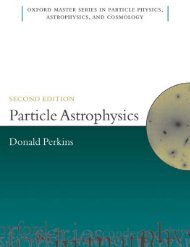
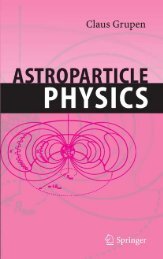
![arXiv:1008.3907v2 [astro-ph.CO] 1 Nov 2011](https://img.yumpu.com/48909562/1/190x245/arxiv10083907v2-astro-phco-1-nov-2011.jpg?quality=85)
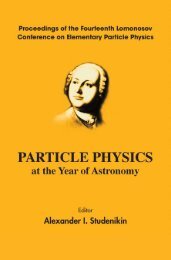
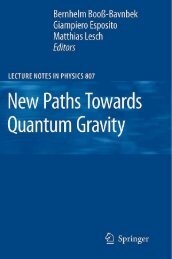
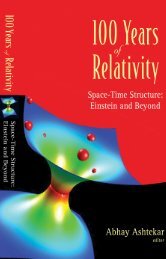
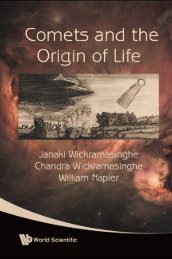
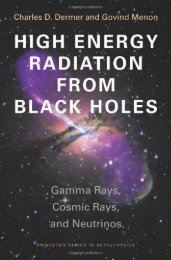
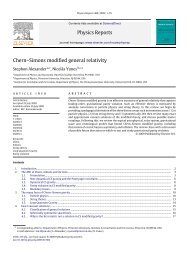
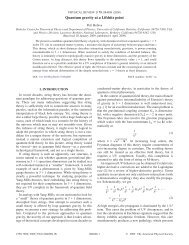
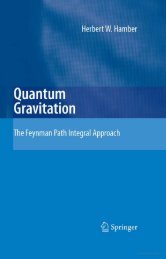
![arXiv:1002.4928v1 [gr-qc] 26 Feb 2010](https://img.yumpu.com/41209516/1/190x245/arxiv10024928v1-gr-qc-26-feb-2010.jpg?quality=85)
![arXiv:1206.2653v1 [astro-ph.CO] 12 Jun 2012](https://img.yumpu.com/39510078/1/190x245/arxiv12062653v1-astro-phco-12-jun-2012.jpg?quality=85)
